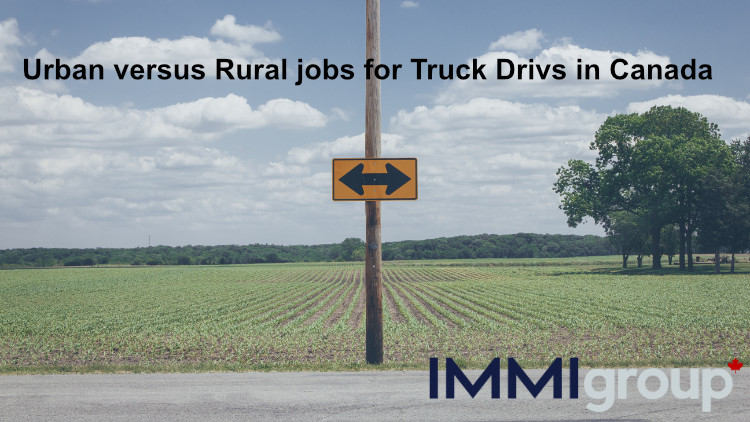Urban versus Rural jobs for Truck Drivers in Canada

Trucking in North America is divided into 3 main categories:
- OTR, which means Over-the-road and is another way of saying long-haul trucking;
- Regional; and
- Local.
So, what is OTR, Regional, and Local Trucking?
- OTR/Long-haul
- An OTR diver will spend from weeks to several months on the road for any given job.
- You’ll end up driving through most of Canada, as well as into the US and even occasionally, Mexico
- You can operate either on your own, which is called solo or as part of a team of usually 2 drivers.
- Basically, you’ll be doing fewer jobs but travelling further for each job.
- You will usually require Class 1/A commercial driving licenses because you’ll be driving large rigs like a tractor trailer.
- You’re paid by the kilometre or by a percentage of what’s called the line-haul revenue or a percentage of the total revenue of the load you transport. You tend to earn significantly more than regional and especially local drivers. Average salaries are around $60,000 annually, but you can make a lot more if you’re willing to put in the time and basically live on the road for long stretches.
- Regional
- A regional driver is out on a job for maybe a week or 2 at a time.
- Because distances are somewhat less, you’ll normally work on your own.
- You tend to specialize driving certain types of cargo within a region like the West Coast, the Prairies, Central Canada, or the Maritimes.
- Compared to OTR/Long-haul drivers, you’ll do more trips over shorter distances.
- You may need a Class 1/A license, or in some cases you might be able to get by with Class 3/D but not if you’ll be driving semis.
- You might get paid by the kilometre or a percentage of the load revenue, but your pay will be somewhat less than long-haul drivers. Average annual salaries are $40,000 to $60,000.
- Local
- If you’re a local driver, you generally get to go home daily.
- The norm is for you to operate on your own and not in a 2-driver team.
- Some local drivers work what are called dedicated routes where you transport the same cargo to the same place on a daily basis.
- Local drivers will also often handle LTL (less-than-truckload) shipments. That may mean getting paid less than for other long-haul or regional jobs. An LTL is less profitable for the company transporting the goods, so it’s something to keep in mind about local routes.
- Local drivers usually get paid by the hour and earn significantly less than long-haul/OTR or Regional drivers. Your salary will range between $30,000 up to around $40,000.
- You can usually get by with a Class 3/D license with local work as you’re often driving straight-body trucks and not semitrailers or 18 wheelers.
If you’re doing more rural routes, you’ll tend to be doing OTR/Long-haul or Regional jobs. Urban drivers tend to be local and often will do dedicated routes, running the same cargo to the same locations, as we mentioned above. Additionally, you will often find yourself starting your trucker career doing local work and then moving up to regional, and finally, long-haul/OTR routes. As you move up to long-haul/OTR you’ll need to graduate to a Class 1/A license. See our chapter on truck driving schools for more information on this.
FAQ
What are the best locations in Canada to drive a truck? (Pay, an abundance of work, low overhead, etc.)
The key is to live reasonably close to major transportation hubs like Vancouver, Calgary, Toronto, or Montreal but not too close as the cost of living is substantially higher in Canada’s largest cities, especially Vancouver and Toronto.
- So, locations like Burnaby or Surrey BC, or even further away in mainland BC, or anywhere in Southern Ontario that’s not actually in Metro Toronto work out well.
- Montreal is somewhat cheaper so anywhere close to Montreal works out well, but you’re going to have to do at least part of your work in French.
- Additionally, provinces like Saskatchewan offer good prospects with much cheaper housing as we explain below in our FAQ: How many truck drivers will be needed in Canada and what does the future look like?
- Remember that while a place like Yukon has good job prospects, it’s very expensive to live in – given how expensive it is to transport goods up to the Northwest of Canada – so make sure your pay is high enough to make it worth it.
Trucking jobs with Walmart and other retailers
Walmart is definitely a place to look for truck driving jobs. They tend to hire on a fairly continual basis and just a quick google search will throw up a few Walmart trucker ads from across the country. You can also work for other major retailers but remember you may need a qualification like an airbrake endorsement. Decide if you want long-haul or short-haul routes as well, because you will need to be more qualified (Class 1/A license for example) to do the long-haul routes.